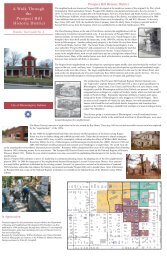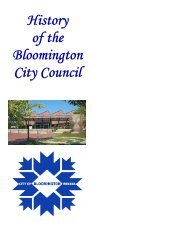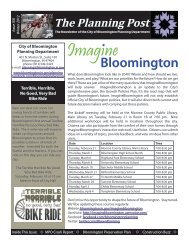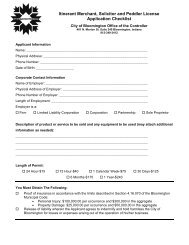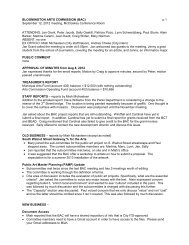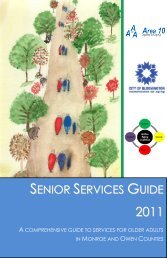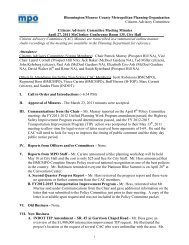Peak Oil Task Force Report - City of Bloomington - State of Indiana
Peak Oil Task Force Report - City of Bloomington - State of Indiana
Peak Oil Task Force Report - City of Bloomington - State of Indiana
You also want an ePaper? Increase the reach of your titles
YUMPU automatically turns print PDFs into web optimized ePapers that Google loves.
11. Remove or reduce legal, institutional, and cultural barriers to farming within<br />
and around the city, and open institutional markets to local food.<br />
• Increase the number and scale <strong>of</strong> community garden plots;<br />
• Promote local food to Monroe County Community School Corporation,<br />
<strong>Bloomington</strong> Hospital, Ivy Tech, and IU;<br />
• Make solar access for passive energy capture and food production a limited<br />
right <strong>of</strong> all city homeowners; and<br />
• Amend the <strong>City</strong>’s Unified Development Ordinance (UDO).<br />
The <strong>City</strong> Council took an important step forward in fostering urban<br />
agriculture with its recent amendment to the UDO to allow community<br />
gardens and urban agriculture in residential zones <strong>of</strong> the city. Urban<br />
agriculture allows the growing <strong>of</strong> food crops through plant cultivation and<br />
includes such activities such as: gardens (front, back and/or side yard),<br />
edible landscapes, ro<strong>of</strong>top gardens, berry patches, and other activities. This<br />
amendment does not permit animal husbandry. The UDO should be further<br />
amended in the following ways:<br />
Urban gardening and community gardens should be permitted in all<br />
zones <strong>of</strong> the city, not just residential zones;<br />
At present, livestock are only permitted in Residential Estate [RE]<br />
zones <strong>of</strong> the city. Animal husbandry should be permitted in all<br />
residential zones and appropriate non‐residential zones. Residential<br />
zones might be limited to smaller animals such as chickens, goats,<br />
rabbits and bees while bigger lots should be permitted to harbor any<br />
livestock; and<br />
The only exception to the city‐wide prohibition against animal<br />
husbandry is the “chicken ordinance.” The ordinance allows residents<br />
in RE and RS zones to keep no more than five hens if all their adjacent<br />
neighbors waive the general prohibition against chickens in these<br />
zones. Furthermore, the ordinance requires a prospective chicken<br />
harborer obtain a permit and pay a fee. Permits are only good for one<br />
year and are conditioned upon an inspection by the <strong>City</strong>’s Animal Care<br />
and Control Department. Not only does this create significant hurdles<br />
for residents wishing to raise chickens, but it also creates a significant<br />
administrative burden for the <strong>City</strong>. As more and more residents turn<br />
to growing and raising their own food, the burden will only increase.<br />
The <strong>City</strong> should eliminate its protracted waiver, permitting, fee and<br />
inspection system and permit all citizens in residential zones to keep<br />
chickens. The enforcement <strong>of</strong> the provision should shift to a<br />
complaint‐based system where problems <strong>of</strong> noise, odor, and other<br />
nuisance are addressed only after they arise.<br />
<strong>Report</strong> <strong>of</strong> the <strong>Bloomington</strong> <strong>Peak</strong> <strong>Oil</strong> <strong>Task</strong> <strong>Force</strong> 193



